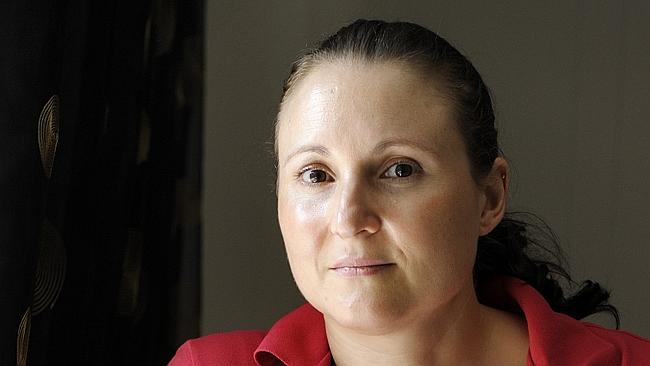
Brisbane nurse Tracy Zordan has just completed her 21 day semi-home isolation after travelling to Sierra Leone, where she treated people sick with Ebola. Picture: Claudia Baxter Source: News Limited
CRYING at funerals was almost unavoidable but nurse Tracy Zordan learnt not to wipe her tears away.
The Brisbane nurse spent five weeks at the 60-person treatment centre in Kenema, eastern Sierra Leone, seeing the devastating reality of the deadly virus sweeping across West Africa.
Ms Zordan, a nurse for 16 years, is not a stranger to humanitarian work but broke down describing the loss of entire families, with Sierra Leone still crippling under the effects of the virus.
“Ebola is quite a shocking disease … it’s so non-discriminatory in the country,” she said.
The nurse, who travelled to Sierra Leone with the Red Cross latein 2014, said due to the nature of Ebola, which is transmitted through direct contact with the blood or body fluids of a person who is infected, personal contact was not allowed.
Attending daily funerals, workers had to be mindful of wiping away their tears if they had not washed their hands just before.
“You really need to think about every single moment … if you have been at a funeral and got a little teary you can’t wipe your tears away unless you know for sure you have washed your hands with chlorine . otherwise you put yourself at risk,” she said.
Every district in Sierra Leone has reported cases at some point during the outbreak with close to 21,000 people infected and more than 8,230 people dying from Ebola across West Africa since the disease first broke out in the region.
Nurses working to control the disease had to don Personal Protective Equipment for an hour at a time to enter the area where those infected with Ebola were being treated.
Ms Zordan, who currently works in the Emergency Department of Redcliffe Hospital, said the virus was nicknamed the ‘Disease of Love’ as it was mostly caregivers to those suffering from Ebola who were affected.
But Ms Zordan said the treatment centre also saw successes, with the ritual of “happy showers” — the last treatment of a chlorinated shower after a person had been cured of Ebola — becoming daily events.
Inspiring stories included that of a mother infected with Ebola losing her little baby, devastated and not taking her medications.
“But we used our phones to take videos of her two other children, who never got Ebola … and when we showed her the video she started drinking and taking her medication.
“She survived and her two kids never got it which is pretty amazing given the situation she was in.”
Ms Zordan also saw two sisters, who had lost their entire family to the disease, encourage each other to get better.
But Ms Zordan, who spent 21 days in voluntary isolation after arriving back in Brisbane, said it was important for the flow on effects of Ebola to be recognised with the country cancelling Christmas last month to prevent public gatherings that could see further spread of the disease.
“The economy has collapsed because so many people have been quarantined — people aren’t able to go to markets anymore, schools and universities have been shut down,” she said.
“We can’t forget it’s going on — numbers in other countries are decreasing but numbers in Sierra Leone have increased — they’re still not winning the fight.”
To donate to the Red Cross Ebola Outbreak Appeal go to www.redcross.org.au.
